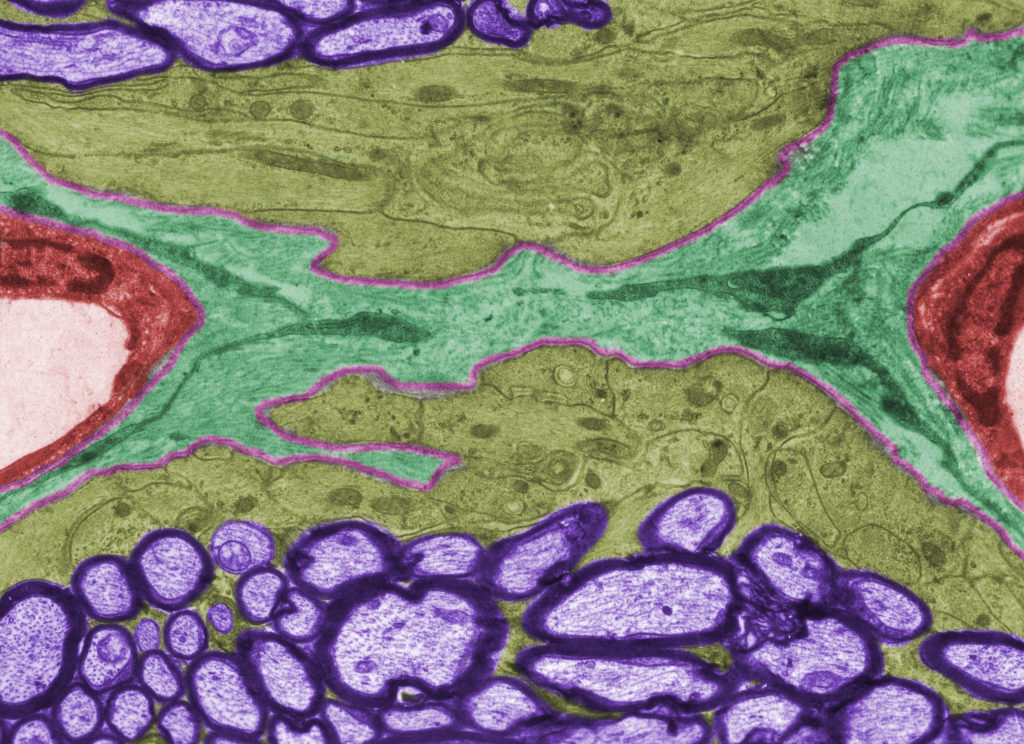Quick Hits
Daily brief research updates from the cognitive sciences

This sounds pretty gruesome – your brain starting to eat itself, like some sort of disease in a horror film. However, research recently published has shown that this process, which we have known about for a long time, is important in developing memory in the short term.
But let’s understand how the brain can eat itself in the first place. There are a number of ways the brain, or rather specific cells in the brain and most of these are good for the brain, digest parts. Firstly, we know that as the brain develops in early childhood there is a key phase of so-called pruning. This is when the brain, or specifically a form of helping cell in the brain called glial cells, cut back connections in the brain. This helps make our brains more efficient and stabilises certain memories and functions.
There are also other processes, and these are often part of everyday cleaning processes whereby a type of glial cell will clear out toxins collected in the brain – and then there is a process whereby damaged cells are cleared out. If the brain does this overenthusiastically, for example after stroke, this can inhibit brain functions.
This we know, but we didn’t know how this works in a day-to-day basis and how this helps plasticity, our brain to develop and learn new things, and therefore memory.
This is where Yosuke M. Morizawa and colleagues at Tohoku University in Japan managed to discover more. They focused on what are called Bergmann Glial Cells and managed to image these as they were “nibbling” on synapses, connections, between neurons.
What was interesting is that when the researchers managed to genetically inhibit this process the learning in mice was blocked. This therefore shows that those cells, by eating away at our brain connections after a learning process, enhance learning.
Therefore, this eating away at our synapses, likely clears out toxins but also improves efficiency of processing and therefore helps us learn more.
So, there you have it your brain eats itself to stay more efficient – but only in a small way, thankfully.

Andy Habermacher
Andy is author of leading brains Review, Neuroleadership, and multiple other books. He has been intensively involved in writing and research into neuroleadership and is considered one of Europe’s leading experts. He is also a well-known public speaker, speaking on the brain and human behaviour.
Andy is also a masters athlete (middle distance running) and competes regularly at international competitions (and holds a few national records in his age category).
References
Yosuke M. Morizawa, Mami Matsumoto, Yuka Nakashima, Narumi Endo, Tomomi Aida, Hiroshi Ishikane, Kaoru Beppu, Satoru Moritoh, Hitoshi Inada, Noriko Osumi, Eiji Shigetomi, Schuichi Koizumi, Guang Yang, Hirokazu Hirai, Kohichi Tanaka, Kenji F. Tanaka, Nobuhiko Ohno, Yugo Fukazawa, Ko Matsui.
Synaptic pruning through glial synapse engulfment upon motor learning.
Nature Neuroscience, 2022
DOI: 10.1038/s41593-022-01184-5
More Quick Hits
How Meditation Helps Pain In Your Brain
Quick HitsDaily brief research updates from the cognitive sciences es, meditation can help with pain by changing your experience of it. I reported on that here. Another piece of research just published shows that how experienced meditators and...
When Stress Is Good For Brain Functioning
Quick HitsDaily brief research updates from the cognitive sciences tress gets a bad rap – understandably it is a negative experience and has been shown over long periods of time, and with high intensity, to cause multiple negative outcomes, from...
Put Your Smartphone Down and Let your Mind Wander – You’ll Be Happier
Quick HitsDaily brief research updates from the cognitive sciences here’s a lot been said about smartphone usage and how it can be used and abused. Most of this concern revolves around usage in children or teenagers, however, with some research...
The Amazing Impact Of Reaching Out To Your Old Friends
Quick HitsDaily brief research updates from the cognitive sciences few weeks ago a friend I hadn’t seen for about 10 years sent me a message and asked if I had time to meet up. I was elated. "Sure," I immediately messaged back, "when and where?!"...
Really? Belief In Conspiracies Not Increasing
Quick HitsDaily brief research updates from the cognitive sciences e may feel like we’re in an age of conspiracy theories, that social media is turbocharging the wild and wacky theories, and the so-called information bubbles are sending people down...
You Wake Up 100 Times Each Night – And That Helps Memory
Quick HitsDaily brief research updates from the cognitive sciences have written numerous posts and articles on sleep and the brain (review here), and the evidence is crystal clear. Good and consistent sleep is essential to all aspects of physical...






